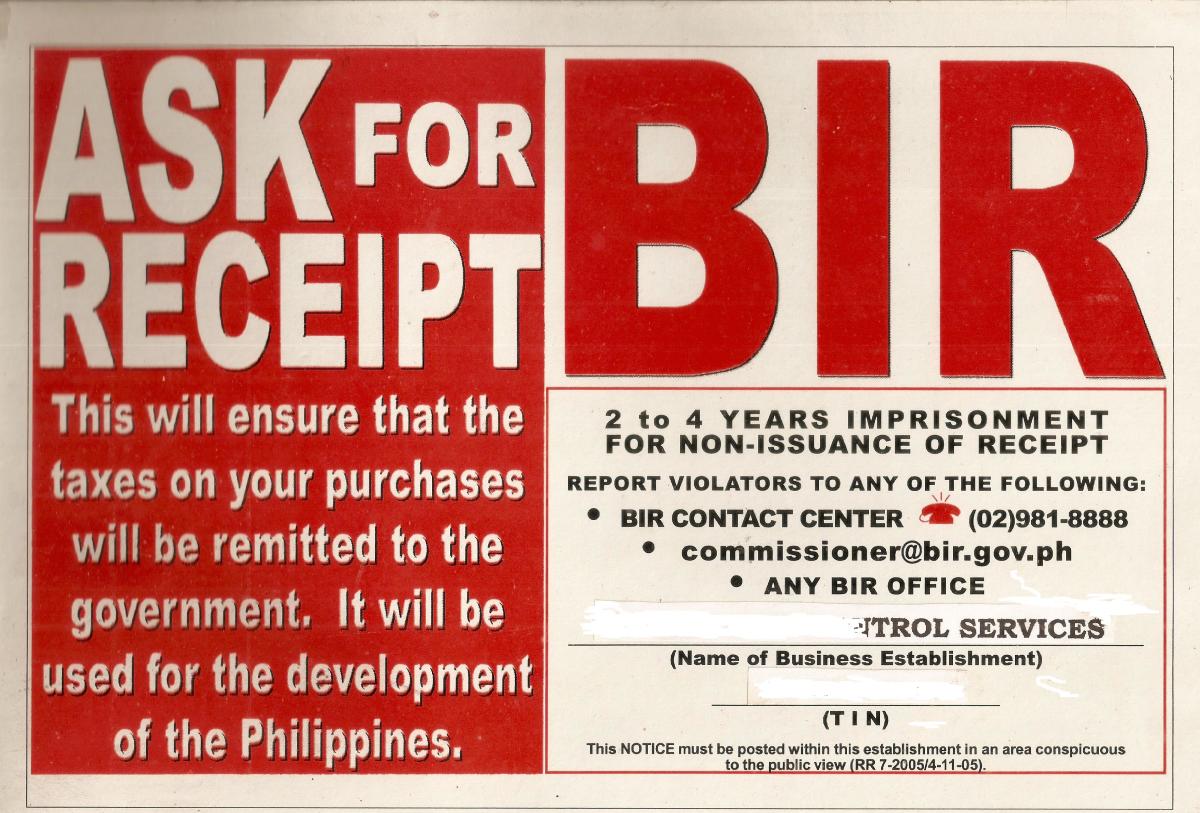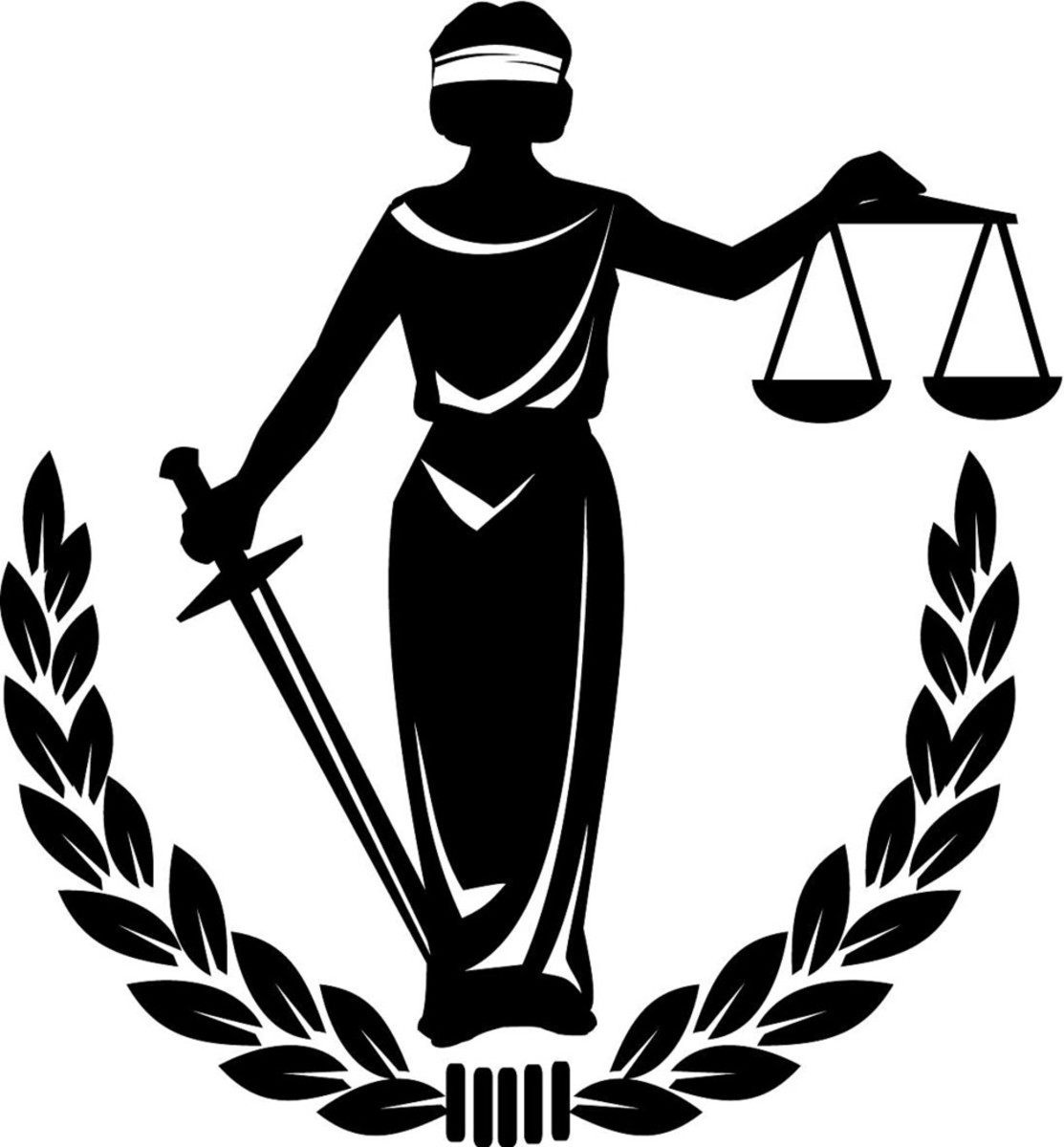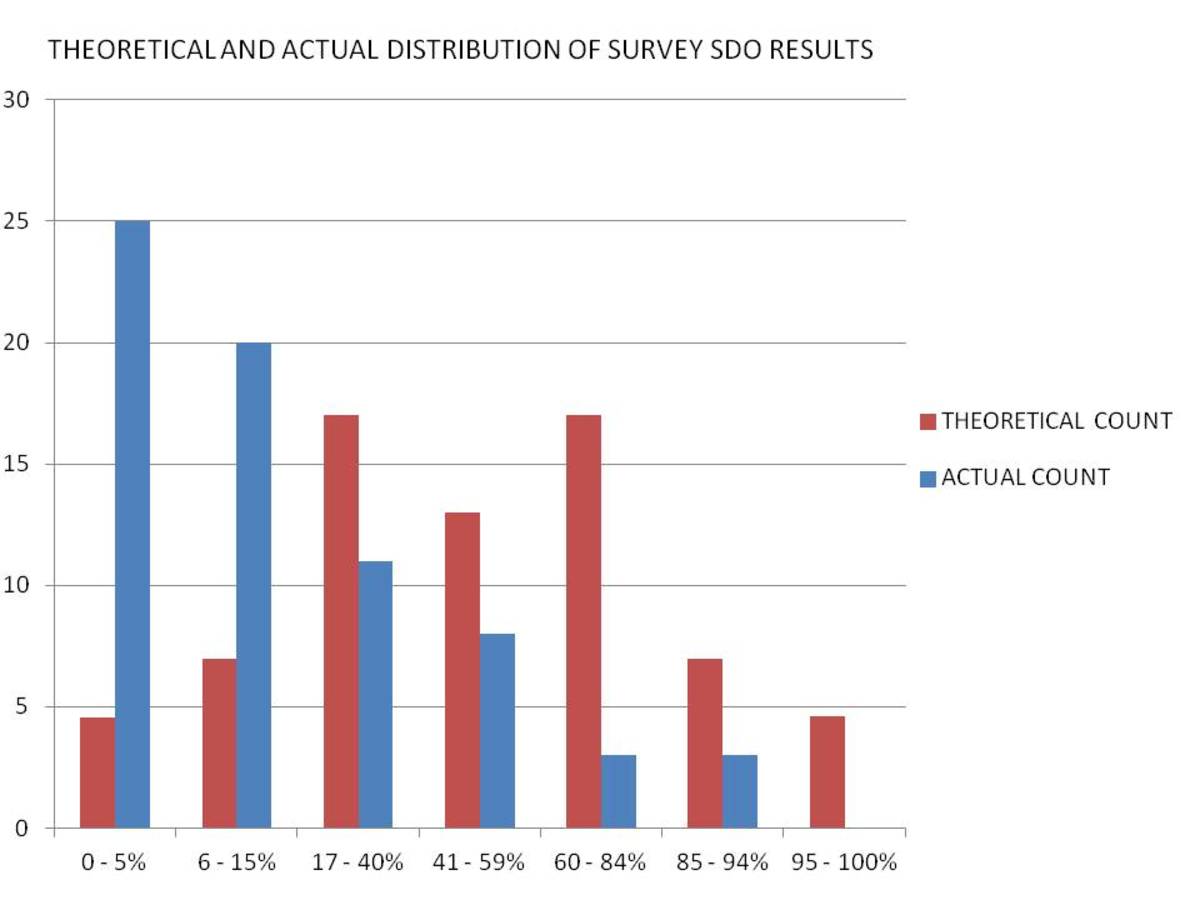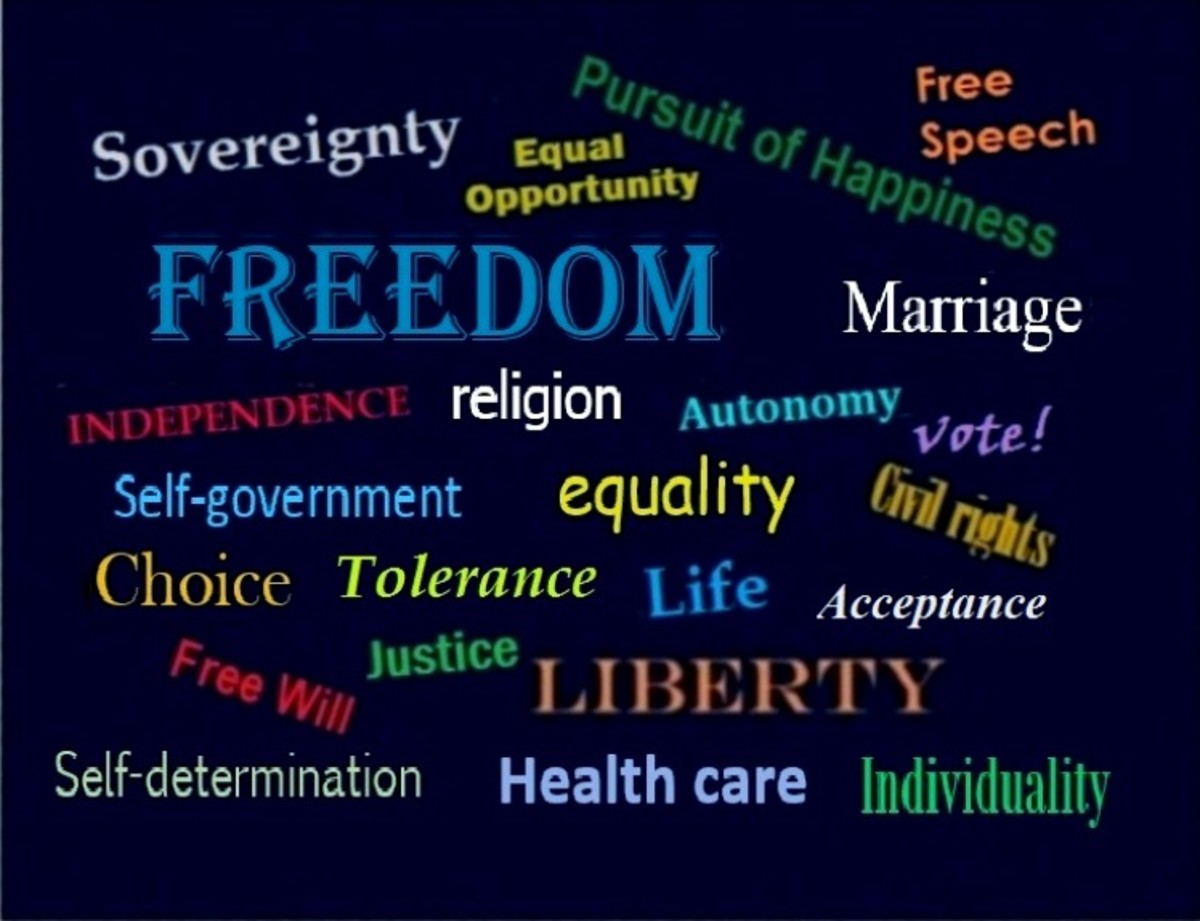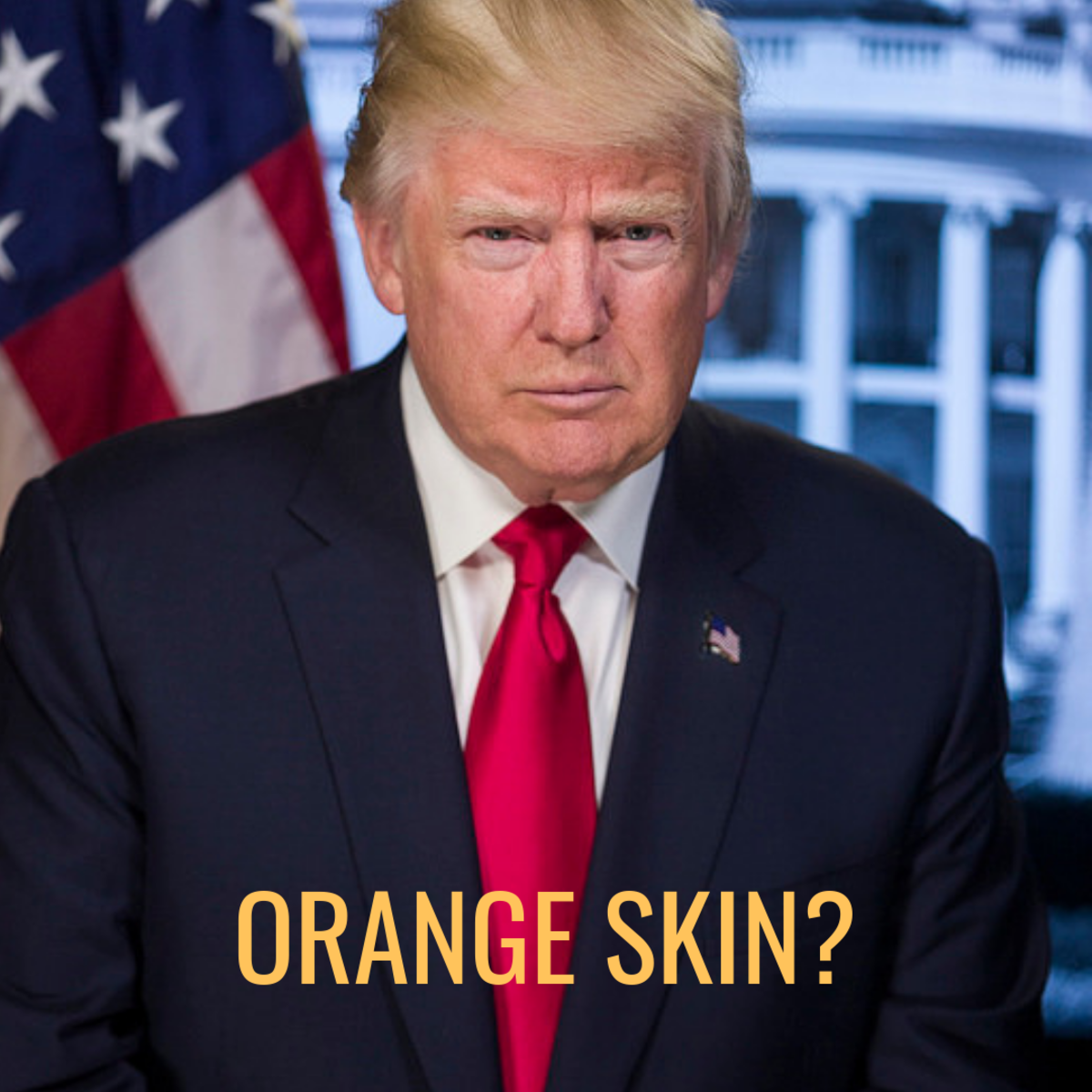On Principle and Pragmatism Vc: What Does Limited Government Really Mean - On Limited US Government? [100]
Articles of Confederaton
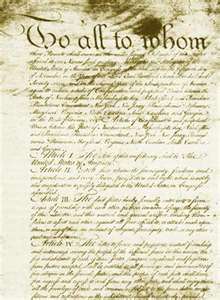
WHAT IS "LIMITED" GOVERNMENT, EXACTLY
LET ME REFER YOU to a counter-point hub by Will Star, a rather Conservative fellow, with whom I did battle with recently and is partly responsible for this hub. It is called "Just Whose Constitution Is It?"; a rather well written piece that generated probably more comments than all of mine put together.
What is meant by the word "limited" in the debate about "limited" government is critical because, if you read the long stream of comments in @Will's hub, it drives a lot of emotion; sometimes heated. It not only fuels a lot of words on hub pages, it does the same on Capitol Hill and in political debates; we have gridlock in Congress because we can't agree on what "limited" government really means.
At the end of the day, however, it is the people, or as Will Starr likes to say, "We The People" who decide what definition "limited" has today, and this is exactly what the Constitution's framers wanted to happen. They left it to the People to decide every two years when we go to the polls. On that note, I have noticed a common theme among most Conservatives to blame "Politicians" for the ills of American society. By doing that, they make it sound like the People had no choice in the matter of who is governing them when, of course, the People are solely responsible. In effect then, when Conservatives blame the "Politicians" for all the problems this country is facing they are essentially blaming "We The People" for those problems, for it is "We The People" who voted our government into office.
One of the challenges I had in my long-winded dialogs with the Conservatives was to get them to define what they meant by "limited" government; I had limited success. I finally decided they had a only a feeling as to what it is they meant, but weren't really able to articulate it beyond referencing the "enumerated" powers. Nor could they point to where, specifically, in the Constitution these limitations were clearly defined in non-ambiguous terms; clearly they can't because it doesn't exist, as you can see from the previous hubs.
The conservative commenters did offer, however, a wonderful collection of quotes, many of which I will share here. I think the most important quote regarding what the founding fathers, and more importantly, the framers of the Constitution thought about "limited" government is the following from James Madison, father of the Constitution and Bill of Rights:
"I, sir, have always conceived -- I believe those who proposed the Constitution conceived -- it is still more fully known, and more material to observe, that those who ratified the Constitution conceived -- that this is not an indefinite government, deriving its powers from the general terms prefixed to the specified powers -- but a limited government, tied down to the specified powers, which explain and define the general terms."
It is my opinion that all of the pushing and shoving that has occurred over the centuries as to how much latitude the Constitution actually does allow has been tested against this sentiment. I think that you will find that when considering almost every Supreme Court decision ever made where the question turned on "did the legislature exceed the authority of the Constitution", each Justice reflected on what Madison had in mind when he said those words.
Let us look for a moment then at what the Constitution actually does say. Article 1, Section 8 is the primary part of the Constitution that describes what the federal government can and cannot do. There are other sections, of course, including Amendments IX and X, but the critical one is Section 8. So, what is in it.
It has two basic parts, the "Enumerated" Powers and the "Necessary and Proper" Clause as reported in the section above on Article 1. Generally, Conservatives focus only on the "Enumerated" powers as the only powers the federal government has, and when they do, they ignore the first enumerated power (see below). Any power beyond the scope of these is reserved to the States or the People via the X Amendment. Within the "Enumerated" powers are two very important ones that have had very broad implications over the years because of the Supreme Court's various interpretations; in some cases the Justices found the actions of Congress fell within concept of "limited" government as proscribed by the Constitution, in other cases it didn't. They are, in part:
- To lay and collect Taxes, Duties, Imposts and Excises, to pay the Debts and provide for the common defence and general Welfare of the United States ...;
- To regulate Commerce ... among the several States, and ... ;
Specifically, it is the "general Welfare" phrase of the first power that is of interest to this discussion as well as the whole of the second power.
WHERE THE RUBBER MEETS THE ROAD VIS-Á-VIS "LIMITED" GOVERNMENT
I ASSERT THE "GENERAAL WELFARE" AND "COMMERCE" clauses are purposefully vague terms used by the framers of the Constitution. It seems to me that if our framers had something more specific in mind, they would have been more specific, doesn't that make sense? But, they weren't prescient and they knew it. They also knew if they were any more specific, the ratification of the Constitution would not happen.
From my discussions with Conservatives it is my sense they do not think the term "general Welfare" isn't vague at all because to them, it has no meaning or it has such a large meaning as to be meaningless. For example, the phrase "How are you?" given when two people greet each other normally is meaningless for neither party really cares a wit how the other fellow is doing. I believe conservatives feel the same way about "general Welfare".
On the flip-side, It seems reasonable to me, however, that the framers did want these words to mean somethiing, otherwise why put them in there? But, they weren't specific, they left it up to the interpretation of the people, through their elected representatives, to determine what "general Welfare" actually meant, given the circumstances of the time.
The Conservative counter to that is, no, when the founding fathers said "limited", whatever they meant by that, they meant VERY limited, strictly limited to the point that "general Welfare" only has symbolic meaning and Commerce between the States is limited to the other Clauses in the Constitution. To me, that is an absurd argument and doesn't give credit to the intelligence of the framers of the Constitution.
It also defies logic. Why in the world did these very principled men spend so much time, energy, and emotion drafting a document that did nothing more than make minor changes to the Articles of Confederation? No, one of the first things the men attending the Convention did, in no uncertain terms, was throw out the Articles in order to begin anew with the purpose of establishing a Federation, with the central government as supreme, rather than a Confederation where the States were supreme.
I think, instead, the framers had something much larger in mind, liberals that they were, more consistent with the creation of a magnificent, progressive new form of government. That is why "general Welfare" and "Commerce" were left vague. While there is no doubt that in order to make the Constitution a reality, they were concerned with the central government not usurping all of the States authority and, in that sense, limited the federal governments power with respect to the States, And, they did this in three ways: 1) the Supreme Court, 2) other Constitutional checks and balances, and 3) the People.
In the first case, if someone thinks the Legislature has overstepped its bounds and created a Law that falls outside the limits of the Constitution, then one of the checks in the system may be brought to bear and a lawsuit can be filed which ultimately will be decided by the Supreme Court as to the constitutionality of the Law, using Madison's words as a guideline. If the Court thinks the Legislature has indeed gone too far, the Court can find the Law unconstitutional and nullify it; which it has many times in our history. If the Legislature doesn't like that decision, it pulls one of its balances out of the bag because it has two options, 1) modify the Law to meet the Courts objections, or 2) attempt to amend the Constitution to make the Law constitutional.
But the framers of the Constitution didn't stop there! They included one more Clause, one that is unique in the Constitution because of its broad scope and ambiguity. It is called the Necessary and Proper Clause; and what a clause it is, it reads (just so you don't have to go back an look):
"To make all Laws which shall be necessary and proper for carrying into Execution the foregoing Powers, and all other Powers vested by this Constitution in the Government of the United States, or in any Department or Officer thereof."
It seems to me that those first ten words are of so big of import that Conservatives simply cannot digest them; "To make ALL Laws which shall be NECESSARY and PROPER...". To me, that is huge! It has the potential for opening the floodgates, which scares the bejeezus out of Conservatives, hell, it scares the bejeezus out of me too; if it weren't for a couple of things. One is the rest of the words in the Clause "... for carrying into Execution the foregoing Powers [the enumerated powers], and all other Powers vested by this Constitution ...". The other is the checks and balances built into our system of government; which has worked so well over time so far.
To begin with, even though the Necessary and Proper clause appears to be quite open-ended, it nevertheless is "limited" by the rest of the Constitution. If Congress chooses to try to push the limits of that envelope, then there is the Supreme Court to stand in its way by being the temporary final arbiter on the constitutionality of the law. But, as I mentioned earlier, it is temporary because Congress still has an opportunity to try to overturn the Courts decision via the Constitutional Amendment process.
Remember also, even if a law passes muster with the Supreme Court, there is still one more hurdle to cross (of course, I am assuming the President went along with all of this or Congress overrode his or her veto). That hurdle is the People. If the People don't like the Law, they can vote out one group and vote in another group who will change the Law.
It is this process which I think James Madison had in mind when he talked about "limited" government.
U.S. Constitution - Signature Page
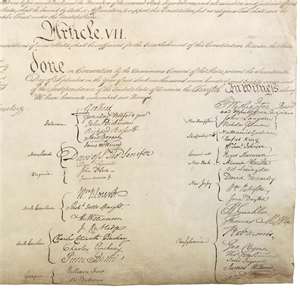
Related and Interesting Hubs
- On Principle and Pragmatism I - U.S. Constitutional ...
OpinionDuck, in one of his comments, invited me to his profile; i am glad I went and would encourage you to go as well. Since I don't have OpinionDuck's permission, I won't copy from the profile but the gist of the opening is that Our opinion is... - On Principle and Pragmatism II - U.S. Constitution R...
Most Americans, including most Conservatives and Tea Party types, as well as Democrats, are not aware how close we came to not having an America at all. Roughly 50% of colonialists wanted something more like the what the European Union is today, exce - On Principles and Pragmatism IIIa - Plato, Washingto...
The foundation for the U.S. Constitution stretch all the way back to 400 B.C. Our Founding Fathers read extensively of the works of Plato and Aristotle. These two great thinkers, among others, had great influence on what our government looks like tod - On Principles and Pragmatism IIIb - Plato, Washingto...
http://myesoteric.hubpages.com/hub/On-Principles-and-Pragmatism-IIIb-Plato-Washington-Adams-Jefferson-and-the-US-Constitution-81 - On Principles and Pragmatism IIIc - Plato, Washingto...
The foundation for the U.S. Constitution stretch all the way back to 400 B.C. Our Founding Fathers read extensively of the works of Plato and Aristotle. These two great thinkers, among others, had great influence on what our government looks like tod - On Principle and Pragmatism IV - What do Plato, Aris...
What are the philosophical underpinnings of the Democratic and Republican political theories; they have very deep roots going back to 400 B.C.E. and two of the most famous thinkers in history. Come read. - On Principles and Pragmatism Va: What Does "Limited"...
This is another in my series on Priciple and Pragmatism which looks at American Constitutional History and tries to apply it to today. This Hub, - Statement of His Holiness the Dalai Lama on the 48th...
10 March 2007 On the occasion of the forty-eighth anniversary of the Tibetan people’s peaceful uprising in Lhasa in 1959, I offer my prayers and tribute to all those Tibetans who have suffered and... - Evolution and Creationism - My Take On Them and How ...
Where do I come from? Why am I here? What is the origin of life? Should we look to science or to the Bible for answers? Or both? Did God create us, or did we evolve from simple sea creatures? Are we related to apes, or especially made in God's image? - Inception and the Philosophy of Pragmatism
For all the interesting science-fiction elements and the exploration of the psycho-physical nature of dreaming Inception is ultimately grounded in basic principles of philosophical pragmatism.

